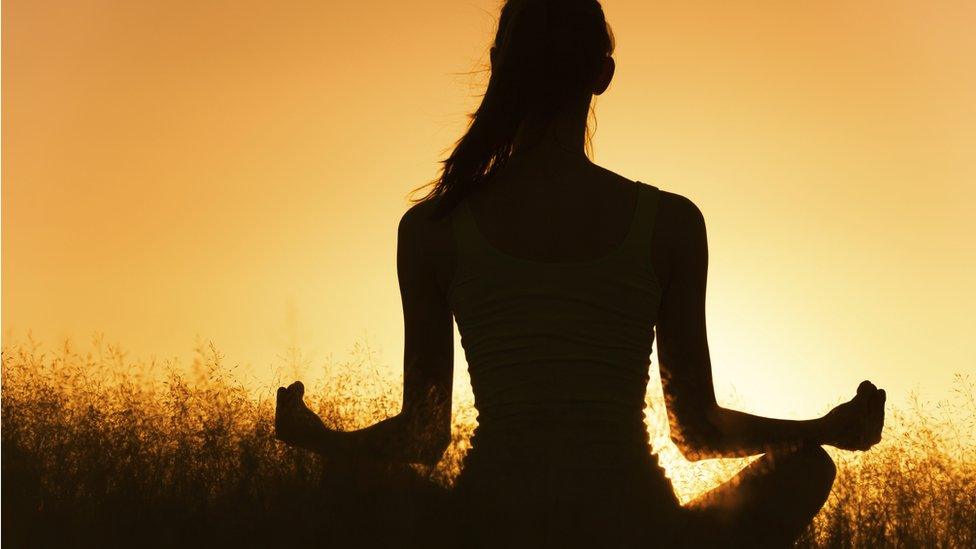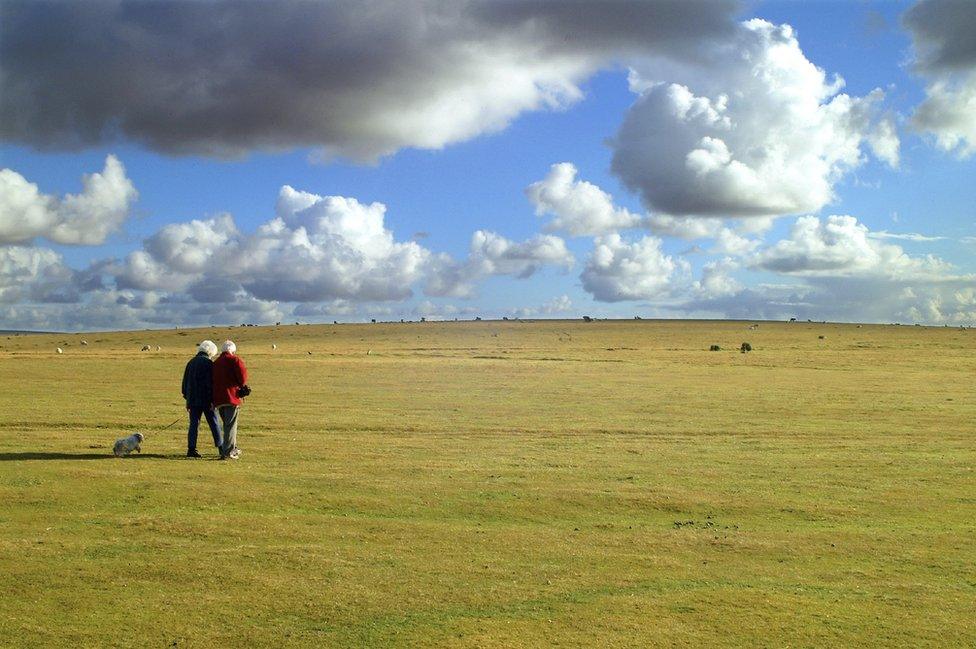A Point of View: Can we ever find a bit of quiet time?
- Published

Is the peace and serenity promised by meditation just an illusion, asks Adam Gopnik.
For New Year, I made two resolutions and now, three months into the year, I can report that I have kept neither. One was to meditate for 20 minutes every afternoon, the other was to listen to good music for an hour every night.
By "meditate" I mean to sit for 20 minutes and breathe while reciting a mantra of my own devising. Well, not exactly of my own devising - I read it in one of the meditation books I buy every year in December to remind me what to think about in January.
By good music I meant not just good music - I listen to the music of my teenage years as I write, the Stones and Eric Clapton and the like, which long ago entered my bones and still vibrates with my heart - but the kind of good music I don't listen to enough. Haydn quartets, Mozart quintets, Schubert octets… You know. All the classical 'tets.

When I meditate, I sit, as the books and teachers recommend, and breathe and try not to think nor to judge how well I'm not thinking. I take 20 minutes, and then, as the book suggest, I bow to the four rivers of my life - the Schukyill of Philadelphia where I was a child, the St Lawrence in Montreal where I came of age, New York's Hudson where I have passed my adult life, and the Seine in Paris, where I found myself as a writer, and where my children were born and became conscious.
Those same children find this ritual, when they observe it, deeply, intractably funny.
The ritual of music listening is in itself, in our culture, another shot at meditation. Simon Gray got a whole good sad play, Otherwise Engaged, about a middle-aged Londoner struggling to listen to his Wagner records while being interrupted by his friends, and family and - Gray being Gray - ex-lovers and current ones too.
In our house, my 20-year-old son is a music major, who actually finds the guitar chords for polyphonic chants and regards my Mozart and Schubert chamber music rather as my father regarded his father's affection for "light classical" music of the Hollywood Strings kind.
He is indulgent but bemused. For that matter, my Spotify'd son regards the CDs that I listen to - which for me have some of the gleaming excitement of the 1980s still lingering in them - as quaint and creaky as the 78s that you could still find in my grandparent's basement when I was small. You needed 20 or 30 of them to hear a single symphony.

Find out more
Hear Adam Gopnik present A Point of View: Resolutions on Radio 4, Friday 18 March at 20:50 GMT and repeated Sunday 20 March, 08:50 GMT - Catch up on BBC iPlayer Radio

The trick about late-night - or even early-evening - music listening in a New York City apartment is that the sound levels have to be balanced for the neighbour's ears as much as for your own. Every New York apartment building is like one of those precariously nested pick-up-sticks constructions - a single loud sound can upset it all, and bring furious neighbours, with no taste for the canon in Berlioz, buzzing up.
So delicate chamber music of that early 19th Century kind is best - though as my musical son reminds me, at proper volume it would be not delicate at all. If we brought three violins and a piano into the apartment they would not be a mid-range murmur but a loud burst of Viennese passion filling the hallways on our sixth floor. There are rules against loud bursts of Viennese passion, and so we turn it down.
My two New Year's resolutions have been very fitfully achieved - ie not achieved at all. Most days the space meant for that meditation - between the end of the working day and the first glass of wine I pour for my wife - passes by in worry and overwork and, of course, in wine. Most nights the music hour passes in watching Game of Cards or House of Thrones or whatever the long form of the moment is.

And while my end in music and meditation is to be more selfless, my family's objection is that the rituals to lead me there seem to be the most self-centred I have. "Dad, are you doing that meditation thing in the living room?" my 16-year-old daughter sighs. "Mum and I were planning to watch the Oscars." The other selves in my life would rather I became less selfish in a less selfish way - more selfless more selflessly.
Brooding over my failure to do what I set out to do - a not-infrequent 3am activity of mine - I realise that these resolutions represent an appetite for detachment, a desire to escape, a need to be elsewhere while being here.
We all feel the need for this escape - it is the constant modern dream of the monastic moment in the day. Some of the pressure that produces this need is local and historical - all of us, without exception, feel overwhelmed by our devices and our computers as we never have before. But I am wise enough (or over-read enough) to know that this has always been the case. Feeling the overwhelming intrusion of the Other is what it means to be modern.

Distraction - a particularly modern condition?
From the beginning of modern times, when life was furnished with steam trains and telegraphs and passenger liners, the first emotion men and women have admitted to is that of being overwhelmed. We are always overwhelmed.
And the companion growth of small spiritual practices, including meditation and a retreat into music - imagined not as a shared sacred activity but as an individual withdrawal - is part of being modern too. For musicians, like my son, listening is a form of reading, a place of information and the transmission of ideas.
For non-musicians like me, it is another form of meditation. Recorded music of course makes this potent, but back in the day it was done with music badly played by the listener herself. Sherlock Holmes had his violin to wail on.
Well, I fail. We all mostly fail at our monastic moments, I suspect - but, could it be, we fail for reasons not in themselves entirely dishonourable? The path we dream of after Christmas, the path to purity of some kind, seems always clouded over with distraction. But maybe we are hearing not only the discords of the self. We hear also the music of others to whom this self owes something - dinner or a draft of homework, desires, recipes and forgotten household duties.
My mind fills with worries and the worries are real. Is there actually a living for my son to make doing arrangements of Renaissance polyphony for acoustic guitar? What gets in the way of our dream of practising detachment, in other words, is our daily practice of attachment, which may after all be the most human thing about us.

Poets on meditation
What is this life if, full of care,/ We have no time to stand and stare./ No time to stand beneath the boughs/ And stare as long as sheep or cows. (Leisure, WH Davies)
The world is too much with us; late and soon,/ Getting and spending, we lay waste our powers;/ Little we see in Nature that is ours;/ We have given our hearts away, a sordid boon! (The World Is Too Much With Us, William Wordsworth)

Meditation's admirable goal is to divorce you from the constant stream of desire that is the human curse, the burn and yowl of "I Want" that can never be satisfied and always keeps us from happiness. But when you do meditate - even as I try out on the deck, on a summer morning in our rented country place - you suddenly sense that not just your inner life but also everything on the planet is pushed, governed by appetite, by wanting something.
The seeming serenity and "peace" of the morning scene by the ocean is actually a melodrama of desperation and desire. The little hummingbird is fluttering desperately looking for the sweet sugar nectar that will keep her beating heart alive, our little dog is rooting round the deck hoping for a scrap from last night's dinner, the birds are calling desperately for sex and searching for food for their existing young and our minds racing in the midst of all of that, so far from being the alien force, is the mirror of all that wanting. Even the beach dune grass and the scrub trees are reaching desperately towards the sun and sky.

The ocean - "a melodrama of desperation and desire"
The serene sounds, at first so lulling, are, one realises, exclusively the dead ones. The sounds to set one's heart by are the purely mineral - the wind blowing, the ocean turning, all the non-wanting bits. These are cosmic sounds in the most frightening sense - they are completely indifferent to life, possible to find on all the dead planets and lifeless stars, where the wind blows, and the water once fell over itself, too.
The spiritually minded (I have boxes of books in front of me by Vietnamese and California Buddhists) teach us, correctly, that the human habit of wanting is the source of all our suffering. But the human habit of wanting is also the source of our knowing what not-suffering feels like. Our wanting may be the best thing about us.
I will try to keep my resolutions better than I have so far, be truer to them than I have been quite yet. But I will not berate my failure too bitterly.
The world is too much with us, yes, but we would miss the world if it weren't, for the world that we escape is the world that we have made. To live among other wants is to be wanted. In the world as it actually is we seek detachment - but we can only practise attachment. We need to. It's the sticky stuff of life.

More from the Magazine

A number of recent books have lauded the connection between walking - just for its own sake - and thinking. But are people losing their love of the purposeless walk?

A Point of View is broadcast on Fridays on Radio 4 at 20:50 BST and repeated Sundays 08:50 BST
Subscribe to the BBC News Magazine's email newsletter to get articles sent to your inbox.